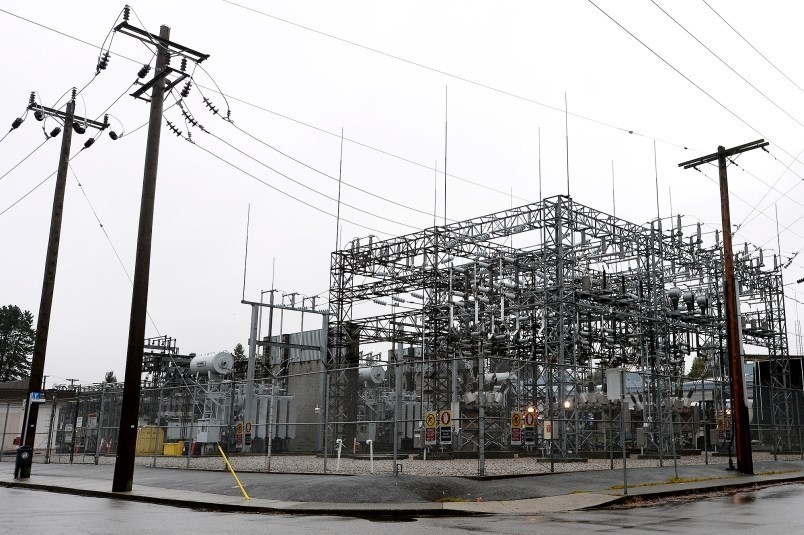Electrical rates, water consumption and pedestrian safety are among the concerns of local residents.
A week after supporters and opponents of a motion calling for a cease fire in Gaza packed council chambers, it was a more subdued delegation period on Monday night. Three residents raised a variety of concerns during the Jan. 222 delegation period.
Lorna Howat expressed concern about the 3.3 per cent increase to the electric utility rates, which took effect Jan. 1. She said the Consumer Price Index has also risen by 3.9 per cent.
“It's challenging, I think, for the poor, the working poor, and for seniors on fixed income to keep paying all these rates that everybody feels the need to raise,” she said.
Howat questioned why the city’s electricity rates went up by 3.3 per cent, when BC Hydro is still awaiting approval (from the BC Utility Commission) for a 2.3 per cent increase that would take effect April 1.
Mayor Patrick Johnstone said the city’s utility commission makes recommendations to council on the utility rates and council ultimately decides whether or not to approve its recommendations. He said the utility commission tries to project into the future where BC Hydro rates are going in future years.
“The attempt of the utility commission is to try to keep the rate increases at a constant level as opposed to being unpredictable. BC Hydro tends to make … less predictable changes in how their rates go up,” he said. “And so, the hope is that we will provide more a predictable increase to our customers, and that over the long-term, over five years or so, it equals out to the same difference, the same change; ours is just less bumpy.”
Coun. Daniel Fontaine thanked Howat for speaking to council on the issue and explaining how rate increases impact some residents.
“I hear all too often that, when it comes to increasing basic utility rates, a couple of dollars here, a couple of dollars there, that it's not really much – just a cup of coffee or something. But I really appreciate that you took the time … to make this real for people,” he said. “A lot of times we talk about millions of dollars and tens of millions of dollars on projects. And for people like yourself $10 or $20 or $30 means something.”
Coun. Nadine Nakagawa said council had previously passed a motion asking the commission to explore equity-based rates. She asked if there is any update available on that motion.
“That has gone to the utility commission, and they are going to do that work before next year's rate changes,” said Johnstone, who serves on the commission “They're going to be determining how we can bring in an equity mandate into that.”
Other concerns and questions
Phillip Goldfeldt, who lives a block away from the təməsew̓txʷ Aquatic and Community Centre, questioned how much grant funding the city received from senior levels of government for the facility and how much over budget that project is.
“I've heard rumors that it's up to $140 million,” he told council. “Is that correct? Does anybody know?”
Johnstone said the city had to increase the budget early on from about $96 to $115 million, but he hasn’t been informed of any large cost overruns. He said the city received a little over $3 million from the provincial government for the daycare that’s attached to the building.
Goldfeldt also told council he’d like to see the three green electrical boxes on Richmond Street covered in decorative wraps like ones in other parts of the city. He also expressed concern about equity in water usage in New Westminster.
“I think it is about time we got some water meters put in,” he said.
Johnstone said water meters are “an ongoing conversation” in the City of New Westminster. He said there is a “significant capital cost” associated with moving to water meters.
“But I will tell you, that is coming,” he told Goldfeldt. “It is coming because Metro Vancouver, who supplies us with our water, is going to require that at some point. But I can't tell you when that's happening.”
Fontaine suggested the city could follow up with Goldfeldt to see if the three electrical boxes he mentioned could be considered for wraps.
Larry Church returned to council to reiterate his desire to see a full intersection at Sixth Avenue and Second Street, which is near Herbert Spencer Elementary School.
“I'm rather disappointed that I'm back here pleading with this council to put in a crosswalk for the children at Herbert Spencer,” he said. “It is coming up four years now, and I'm still asking for this crosswalk. … We need the crosswalk for these children.”
Council members did not question Church about his presentation.
In past meetings, Fontaine has put forward motions that the city provide funding for a full intersection at Sixth Avenue and Second Street. Council has not approved that work, with the majority of council members saying intersection improvements should be considered on the basis of locations outlined in an intersection safety report developed by staff and should not be done on an ad-hoc basis based on a delegation to council.



